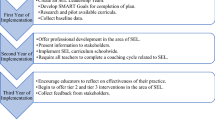I have fought the good fight, I have finished the race, I have kept the faith
(II Timothy 4:7, The New King James Version)
Abstract
This article examines Black educators’ experiences in Grow Your Own programs along a teacher development continuum at the intersection of social and human development constructs and frameworks, such as double binds and Phenomenological Variant Ecological Systems Theory (PVEST). More robust and nuanced interpretations of how Black educators grow and sustain their presence in the field of education are explored utilizing these analytical tools to determine how Black educators make their way along the teacher development continuum. Findings related to Black educators’ development as they transition as students to teachers, using double bind constructs at each stage of PVEST, are described, and research and praxis questions are extended for implications.
Similar content being viewed by others
References
Achinstein, B., & Ogawa, R. T. (2011). Change(d) agents: New teachers of color in urban schools. New York City: Teachers College Press.
Clark, L. M., Frank, T. L., & Davis, J. (2013). Conceptualizing the African American mathematics teacher as a key figure in the African American education historical narrative. Teachers College Record, 115, 1–29.
Clewell, B. C., & Villegas, A. M. (1999). Creating a nontraditional pipeline for urban teachers: The pathways to teaching careers model. Journal of Negro Education, 68(3), 306–317.
Dilworth, M. F., & Brown, A. L. (2008). Teachers of color: Quality and effective teachers one way or another. In M. Cochran-Smith, S. Feiman-Nemser, & D. J. McIntyre (Eds.), Handbook of research in teacher education: Enduring questions in changing contexts (pp. 424–444). New York, NY: Routledge.
Foster, M. (1997). Black teachers on teaching. New York, NY: New Press.
Gershenson, S., Hart, C., Lindsay, C., & Papageorge, N. W. (2017). The long-run impacts of same-race teachers. https://www.econstor.eu/bitstream/10419/161253/1/dp10630.pdf.
Gist, C. D. (2017). Voices if aspiring teachers of color: Unraveling the double bind in teacher education. Urban Education, 52(8), 927–956.
Griffin, A., & Tackie, H. (2017). Through our eyes: Perspectives from black teachers. Phi Delta Kappan, 98(5), 36–40.
Grissom, J. A., & Redding, C. (2016). Discretion and disproportionality: Explaining the underrepresentation of high-achieving students of color in gifted programs. AERA Online, 2(1), 1–15.
Ingersoll, R., and Merrill, L. (2017). A Quarter Century of Changes in the Elementary and Secondary Teaching Force: From 1987 to 2012. Statistical Analysis Report (NCES 2017-092). Washington, DC: National Center for Education Statistics. https://files.eric.ed.gov/fulltext/ED573526.pdf.
Jones, R., & Jenkins, A. (2012). Call me mister: The re-emergence of African American male teachers in South Carolina. Advantage Media Group: Charleston, SC.
Matkins, T. C. (2011). The black teacher shortage: A literature review of historical and contemporary trends. The Journal of Negro Education, 80(3), 417–427.
Mawhinney, L. (2014). We got next: Urban education and the next generation of black teachers. New York: Peter Lang.
Milner, H. R. (2006). The promise of black teachers’ success with black students. Educational Foundation, 20(3/4), 89–104.
Siddle-Walker, V. (2005). Organized resistance and Black educators’ quest for school equality, 1878–1938. Teachers College Record, 107(3), 355–388.
Skinner, E. A., Garreton, M. T., & Schultz, B. D. (2011). Grow your own teachers: Grassroots change for teacher education. New York: Teachers College Press.
Spencer, M. B. (2006). Phenomenology and ecological systems theory: Development of diverse groups. In W. Damon & R. Lerner (Eds.), Handbook of child psychology (pp. 829–893). New York, NY: Wiley.
Stewart, D., & Shandasni, P. (1990). Focus groups: Theory and practice. Newbury Park, California: Sage Publications.
Taie, S., and Goldring, R. (2017). Characteristics of public elementary and secondary school teachers in the United States: Results From the 2015–16 National teacher and principal survey first look (NCES 2017-072).Washington, DC: National Center for Education Statistics. https://nces.ed.gov/pubs2017/2017072.pdf.
Author information
Authors and Affiliations
Corresponding author
Rights and permissions
About this article
Cite this article
Gist, C.D. Black Educators Fight Back: Facing and Navigating Vulnerability and Stress in Teacher Development. Urban Rev 50, 197–217 (2018). https://doi.org/10.1007/s11256-018-0446-0
Published:
Issue Date:
DOI: https://doi.org/10.1007/s11256-018-0446-0




